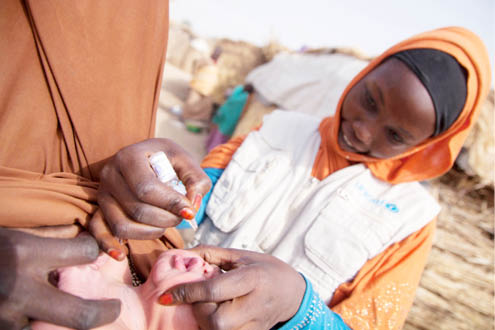How Nigeria can sustain polio free status –Expert
Chair of the Rotary Nigeria National Polio Plus Committee, Dr Tunji Funsho has warned that Nigeria could still witness polio cases if efforts on maintaining a polio free status were not sustained. He stated this during an interview with Daily Trust in Lagos. Rotary Nigeria National Polio Plus Committee is an arm of Rotary International, […]

Chair of the Rotary Nigeria National Polio Plus Committee, Dr Tunji Funsho has warned that Nigeria could still witness polio cases if efforts on maintaining a polio free status were not sustained.
He stated this during an interview with Daily Trust in Lagos. Rotary Nigeria National Polio Plus Committee is an arm of Rotary International, a foremost service and charity-based social organisation with chapters in virtually all countries of the world. The organisation was one of the stakeholders that contributed to the recent removal of Nigeria from the list of polio endemic countries by the World Health Organization (WHO).
He said: “In Nigeria, we have fought to the point that we have been certified polio-free. But Nigeria can still be re-infested from outside the country like we have seen in some other countries. We need to continue doing the work we have been doing.”
Dr Funsho said a very important aspect of the work was to continue to improve the country’s immunisation programme and to keep up the campaign by going from house to house in a bid to get children immunised.
“Another aspect is to also make infrastructure available in the rural communities across the country and for people to be able to access primary healthcare centres. This is a national issue and Nigeria as a country is becoming a small country. So if there is polio virus in any part of the country, no child will be safe except that child has been optimally immunised against polio.
“We also need to provide good, clean, potable water and promote good sanitary conditions among our people so that polio does not return to the country, because the virus that causes polio thrives in unhygienic environments. So, the immunisation, advocacy and awareness must continue on the part of all stakeholders, including the federal government. The government must continue to lead the way, so that we finally get out of the woods,” he added.
On the role the committee played in eradicating polio in Nigeria, he said Rotary Nigeria National Polio Plus Committee was just an enabler in what Rotarians are doing in the country.
Kudos goes to all Rotarians across the country who have worked relentlessly to ensure that Nigeria’s name was removed from the United Nations list of countries with cases of polio. Special thanks go to those who are either involved in advocacy, creating awareness or raising funds or actually being involved in getting children immunized. In all, what the committee did was to give assistance, direction and motivation. I have been personally involved in all aspects, as the chairman, for seven years, just like every Rotarian who has been deeply involved.”
He said the organisation has been working all over the country and was involved in the North-East when the insurgency brought four new cases. “We traveled there frequently by helicopter to avoid roads that were not safe at that time to reach areas like Mungono, where the last cases of polio was reported. We were also in Port-Harcourt and Uyo where they saw their own last cases. We were in Kano, Maiduguri and Sokoto to also assist in the fight to eradicate polio from the areas and we met with all types of leadership; political, traditional and religious leaderships, to carry out advocacy campaigns and enlightenment programmes.”
He said Rotarians collaborated with John Hopkins Hospital, a foremost health institution in the United States, adding that the amount of money and time spent annually could not be quantified. He however said that the organisation committed about $17 billion worldwide, and spent roughly $300 million in Nigeria alone, and was still counting.
He said he received the news of Nigeria’s removal from polio endemic countries by WHO with mixed feelings, “I was relieved that at the end of the day, we got the job done, that we kept our promise to the children that we will not allow them to be infested with polio again. I also realised that another phase of our work has just started. As they say, it is difficult to get to the top, and even more difficult to stay at the top. We cannot rest on our oars, especially when there are still Polio cases in two other countries that are neighbouring Nigeria. So, it’s just one milestone we have achieved. The real milestone is when the world is certified Polio-free.”
He said the committee would continue its roles to keep polio at zero level at all times.
Daily, scores of mothers with children usually below 5-years of age strapped on their backs queue up in a hall inside the numerous primary health care centres spread across the country to get the children immunised against Polio.
Some of the children cry as a result of the discomfort they get from the heat in the halls, but unworried, the mothers wait patiently to get to their own turn.
One after the other, the mothers open up the mouths of their children to enable them to receive drops of the polio vaccine, so that the children would not be affected by the polio virus, which causes paralysis, especially among children.
